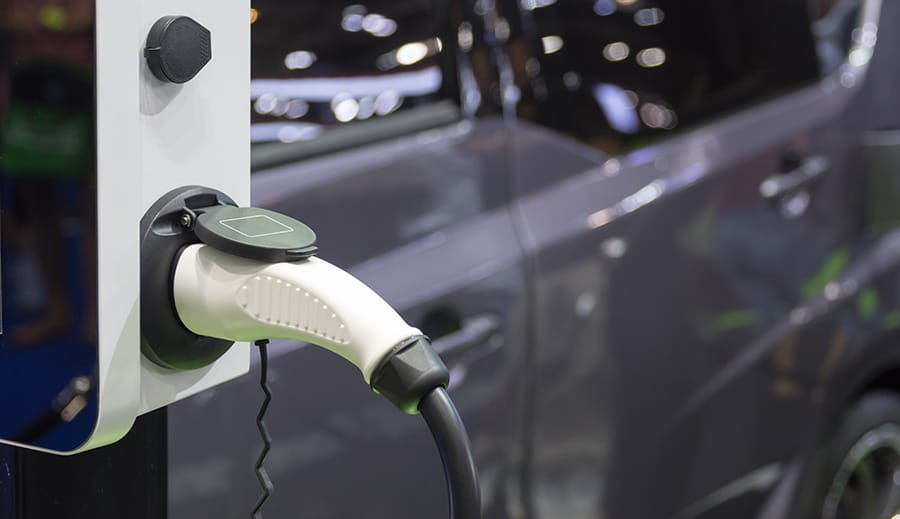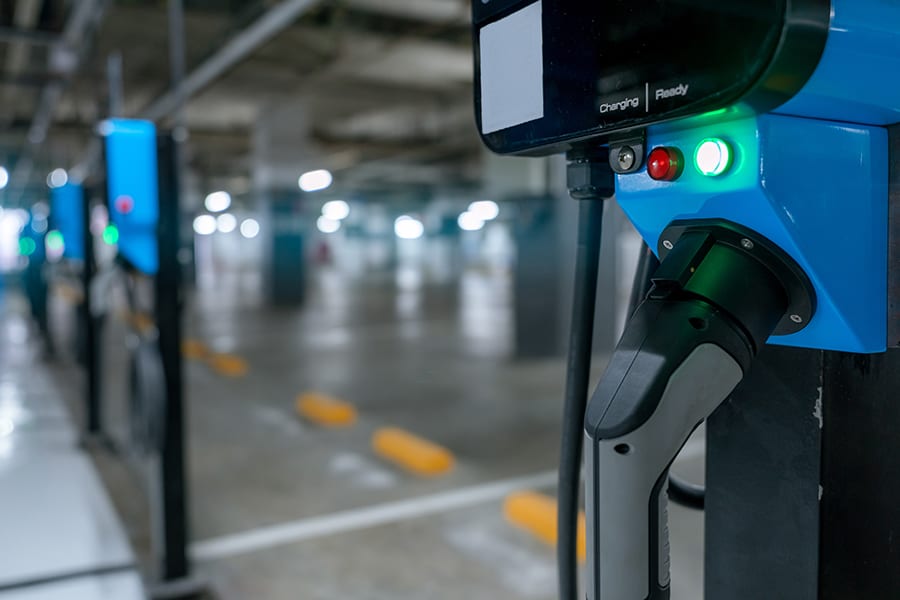How long does it take to charge an electric car? It depends on your charger and battery, and it can range from a quick hour to 72 hours!
We’ll crunch the numbers to figure out the charge time, and you’ll soon discover if you’re gonna miss those quick pit stops at the gas station.
6 factors affecting an EV’s battery charging speed

#1 Battery size
The bigger your battery, the longer it takes to charge. We measure battery capacity in kilowatt-hours (kWh).
#2 Current battery charge level
Starting from empty? It’ll take longer. If you’re just topping off from 50%, you’ll see a significantly shorter charge time.
#3 Max electric vehicle charge rate
When you hook up your EV to most chargers, you’re supplying Alternating Current (AC) to your car. However, your EV stores energy as Direct Current (DC) in its battery.
To convert AC to DC, your car uses an onboard charger. Different EVs have onboard chargers with varying max charging capabilities. Let’s say your onboard charger has an 11kW rating. Plugging into a 15kW charger won’t speed things up.
Another way to think about the max charge rate is in terms of amps, which relates to power. For the Tesla Model 3, Tesla states,
“Maximum charge rate for Model 3 Standard Range is 32A (7.7kW) – up to 30 miles of range per hour.”

Important Note: DC Fast chargers are speedy. You no longer rely on your car’s onboard charger to convert AC to DC. Instead, you use the charger’s industrial-strength AC to DC converter.
But hang on, there are still limits. Every EV has a BMS, or Battery Management System, which controls your charging session and tells the charger how much power to supply.
The Tesla Model 3, for example, can support up to 250 kW, which the V3 Superchargers deliver. And that’s even with the Model 3’s onboard charger rating of 11.5kW.
#4 Max charging rate of the charger
Different charger types have different power output ceilings. Let’s say your EV has an onboard charger rated 15kW. But if your external charger’s power rating is 10kW, the peak charge will be no greater than 10kW.
#5 Battery tapering
Imagine zipping through charging your electric vehicle (EV) from a low battery capacity to 80% in a snap. But then, suddenly, it’s like hitting the brakes, and the charging speed slows down to a crawl. Why does this happen? Well, it’s to protect the battery from damage due to its inherent characteristics. Plus, the EV’s charging profile completely controls this charging slowdown.
To make it easier to picture, let’s use a simple water analogy. Imagine filling a glass to the brim without spilling even a single drop. You’d start by turning the faucet on full blast, then gradually slow down the flow to precisely control the last few drops. That’s how battery tapering works!
#6 Weather conditions
Cold temperatures mean longer charging times for your EV. Why? Well, it’s because the electrochemical reactions in batteries depend on temperature.

Important Note: Many smart EVs can deal with chilly weather just fine, thanks to some clever engineers who designed them to warm up their batteries before charging. This way, they can charge up faster in cold conditions.
Learning the car charging units
Before diving into the world of EVs, it’s crucial to understand the basics of electricity, like the difference between kW and kWh. You’ll see these two acronyms everywhere when you’re dealing with EVs. The “k” stands for “kilo,” which is 1,000, so “kW” means 1,000 watts.
Watts (W) measure power, with one watt being equal to one joule of energy used or produced per second. Imagine you turn on a 100-watt lightbulb – it’ll draw 100 joules of energy every second it’s on. So, a 50,000-watt battery charger will charge a battery faster than a 10,000-watt charger.
Now, kWh (kilowatt-hour) measures energy, and it’s used to show how much stored energy a battery has. For instance, a 1,000-watt bulb can stay on for an hour using a battery with 1 kWh of capacity.
The charge time calculation for an EV’s battery

We measure an EV battery’s capacity in kilowatt-hours (kWh) of energy it can hold. When shopping for an EV, you might see something like this:
New vehicle model with an 82 kWh battery pack
The charger’s rated power in kilowatts (kW) helps us figure out the charge speed. With that, we can calculate the approximate charge time for an EV using this formula:
Charge time = ![]()
Here, 0.87 is an approximation of an EV charger’s efficiency.
Tesla Model 3 Long Range charging time with a Level 2 Charger calculation
Let’s say we’re charging a Tesla Model 3 Long Range with an 82 kWh battery using a 7 kW charger.
Charge time = ![]() = 13.5 hours
= 13.5 hours
So, it’ll take 13.5 hours to charge the battery from empty to full capacity.
Tesla Model 3 Long Range charging time with Tesla’s V3 Supercharger calculation
According to Tesla,
V3 is a completely new architecture for Supercharging. A new 1MW power cabinet with a similar design to our utility-scale products supports peak rates of up to 250kW per car.
You won’t be getting that 250kW peak power throughout your entire charge. In fact, it might only last for a few seconds before tapering off as your battery fills up.
To give you a better idea of what’s going on, check out the table below. It shows how the peak power changes over time as your EV charges using a typical 250kW DC fast charger.
| Charging Time | Peak power |
|---|---|
| 5 minutes | 245 kW |
| 15 minutes | 225 kW |
| 20 minutes | 200 KW |
| 30 minutes | 135 kW |
| 40 minutes | 85 kW |
| 50 minutes | 50 kW |
| 60 minutes | 35 kW |
Now, let’s simplify things and assume an average peak demand of 100kW throughout the charge.
Charge time = ![]() = 0.94 hours
= 0.94 hours
So, in real-life terms, it’ll take about an hour to charge your Tesla Model 3 Long Range from empty to full.

Important Note: Your charging time will vary based on the type of charger you’re using. Here are the peak power values for common chargers:
- Level 1 charger: 1.92 kW
- Level 2 charger: 12 kW
- DC fast charger (Level 3 charger): 250 kW
Keep in mind, each type of charger will have different charging costs too.
“How long does it take to charge an electric car?” wrap up
A myriad of factors come into play when it comes to charging time for EVs, pretty much like powering up your trusty smartphone.
But, by using a handy charge time calculation, you can ballpark your EV’s charging time like a pro. This way, you can plan ahead, deciding when and where to get that electric boost.
What’s your EV ride of choice, and how long does it usually take to charge? Any nifty tricks up your sleeve for optimizing your EV charging experience?
